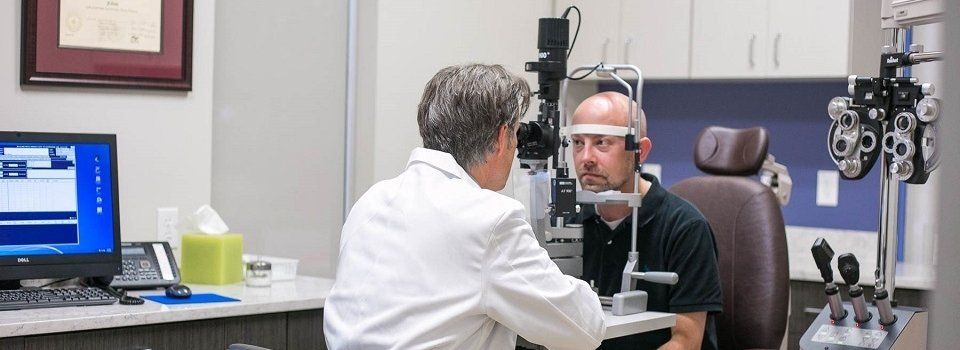Eye Exam
COMPREHENSIVE MEDICAL EYE EXAM (CMEE)
For those over the age of 35, it is recommended you have a Comprehensive Medical Eye Exam every two years. For patients over 65 (or those with a family history of diabetes, glaucoma or other diseases that affect vision) it is recommended you have a CMEE on a yearly bases.
A Comprehensive Medical Eye Exam not only evaluates your visual acuity, but will also help to identify other potential issues and eye diseases. This is very important as certain diseases like Glaucoma can lead to serious vision loss if not detected early. And, unfortunately, many times patients don’t experience any vision symptoms before the vision loss occurs.
WE WOULD LOVE
TO SEE YOU
Contact Us
What to Expect
To begin : An assistant or technician will document your medical history, family history, and any current symptoms. Next, they will normally perform a number of tests to check your visual acuity, eye muscle function, eye pressure, dryness, along with a few other things.
Additional Tests : Additional tests may be done based on your general history of eye health, or if you have any current symptoms, existing eye conditions, or other risks. This portion of the test will normally take 20-30 minutes, but could take up to 45 minutes or longer in certain cases.
Details of Possible Tests:
Visual Acuity or Refraction Test: This determines the degree to which you may have any nearsightedness, farsightedness or astigmatism.
Muscle Function Test: This checks the movement of your eyes in each direction at specified angles, and will identify any involuntary eye movement or muscle weakness.
Binocular Vision Skills Assessment: This tests your eyes ability to work together properly as a team. This is important for proper eye muscle coordination, accurate depth perception, and your ability to change focus from far-to-near and near-to-far objects.
Visual Field Test: This measures your peripheral vision and detects certain eye diseases or neurological disorders.
Eye Pressure Test: There are a number of tests to evaluate your intra-ocular pressure as high intra-ocular pressure could be a sign of glaucoma.
Color Vision Screening: This tests for proper perception of colors.
Ophthalmoscope Eye Health Assessment: This evaluates your retina, cornea, optic nerve, lens and pupil responses.
Eyes Dilated: Your will most likely have your eyes dilated in order to better see the retina at the back of your eye. Once you have had the drops, it normally takes about 15 minutes for them to take effect. You should also consider making transportation arrangements, as your vision will be blurry for a few hours following the dilation.
Doctor Analysis: You will then be seen by the doctor for the final part of your exam. The doctor will review all data collected up to this point before double-checking your prescription. They will then use the slit lamp to analyze the surface of the eye, the lens, and the retina. This part of the exam is to check for things like cataracts, retinal problems, and other risky conditions.
Exit Consultation: At the conclusion of your examination you will be presented with the results, You will also be provided any necessary treatment options so you are armed you with relevant knowledge and an up-to-date understanding of your eye health.
To learn more, or to schedule your comprehensive medical eye exam today, please Call (512) 528-1144 or Contact Us.



